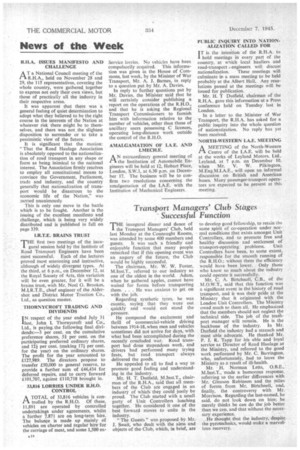Transport Managers' Club Successful Function Stages
Page 20

If you've noticed an error in this article please click here to report it so we can fix it.
THE inaugural dinner and dance of the Transport Managers' Club, held last Monday at the Connaught Rooms, was attended by some 400 members and
guests. It was such a friendly and enjoyable function that many people remarked that if this (*ening event was an augury of the future, the Club would be highly successful.
The chairman, Mr. W. W. Foster, NEInst.T., referred to our industry as one of the oldest in the world. Adam, when he gathered apples, cannot have waited for forms before transporting them. . . . He was anxious to get on with the job.
Regarding synthetic tyres. he was caustic, saying that they wore out quickly and would not stand the pressure.
He compared the excitement and thrill of commercial-vehicle driving between 1914-18, when men and vehicles sometimes did not arrive for days, with what had been accomplished during the recently concluded war. Road transport had done stupendous work, and drivers had performed many trying feats, but road transport always delivered the goods.
He appealed to all to find a way to promote good feeling and understanding in the industry.
Mr. H. T. Dutfield, Minst.T., chairman of the R.H.A., said that all members of the Club are engaged in an industry of which, they could justly be proud. The Club started with a small party of Unit Controllers lunching together. He considered it one of the best forward moves to unite in the industry. " The Guests" was proposed by Mr. J. Swait, who dealt with the aims and objects of the Club, which, in brief, are
to develop good fellowship, to retain the same spirit of co-operation under normal conditions that exists amongst Unit Controllers, and to promote free and healthy discussion and settlement of transport-operating problems. Unit Controllers have been, to some extent, responsible for the smooth running Of the R.H.O.; without them the efficiency would have been lower. . Only those who know so much about the industry could operate it successfully.
Mr. C. A. Birtchnell, C.13„ of the M.O.W.T., said that this function was a significant event in the history of road transport, and it was their pride at the Ministry that it originated with the London Unit Controllers. The Ministry owed much to them all. He emphasized that the members should not neglect the technical side. The job of the trankport manager will remain. He is the backbone of the industry. In Mr. Dutfield the industry had a staunch and most able advocate. He thanked Mr. P. J. R. Tapp for this able and loyal service as Director of Road Haulage at the Ministry, and referred to the good work performed by Mr. C. Barrington. who, unfortunately, had to leave the Ministry as a result of ill-health. Mr. H. Norman Letts, 0.B.E.,' made a humorous response. referring ta the earlier differences with Mr. Gleason Robinson and the miles of forms from Mr. Birtchnell, and, finally, the controversy with Mr. Morrison. Regarding the last-named, he said, do not look down on him; he merely thinks he can do the job better than we can, and that without the necessary experience.
He thought that the industry, despite the pyrotechnics, would make a marveE lous recovery.




























































